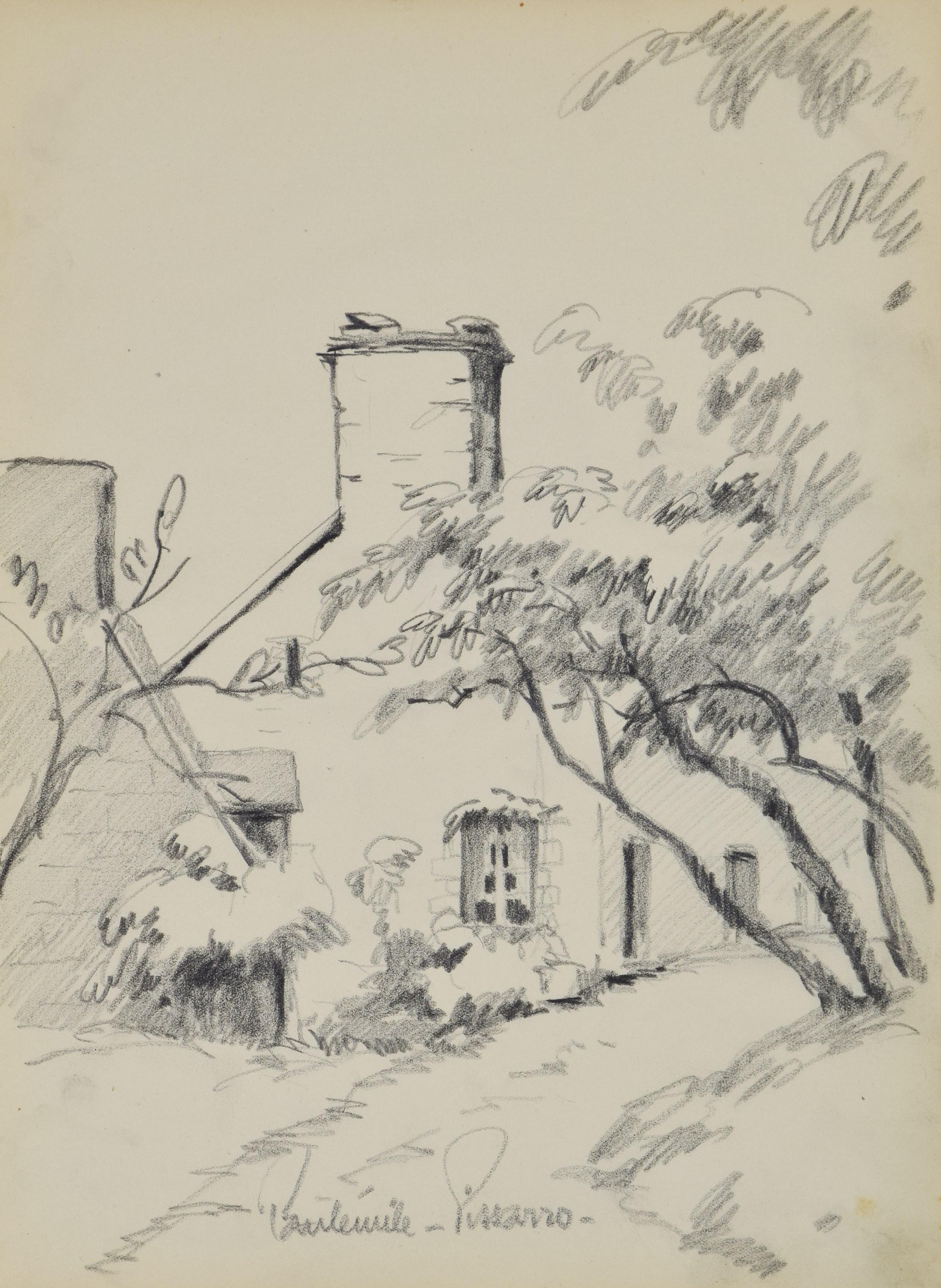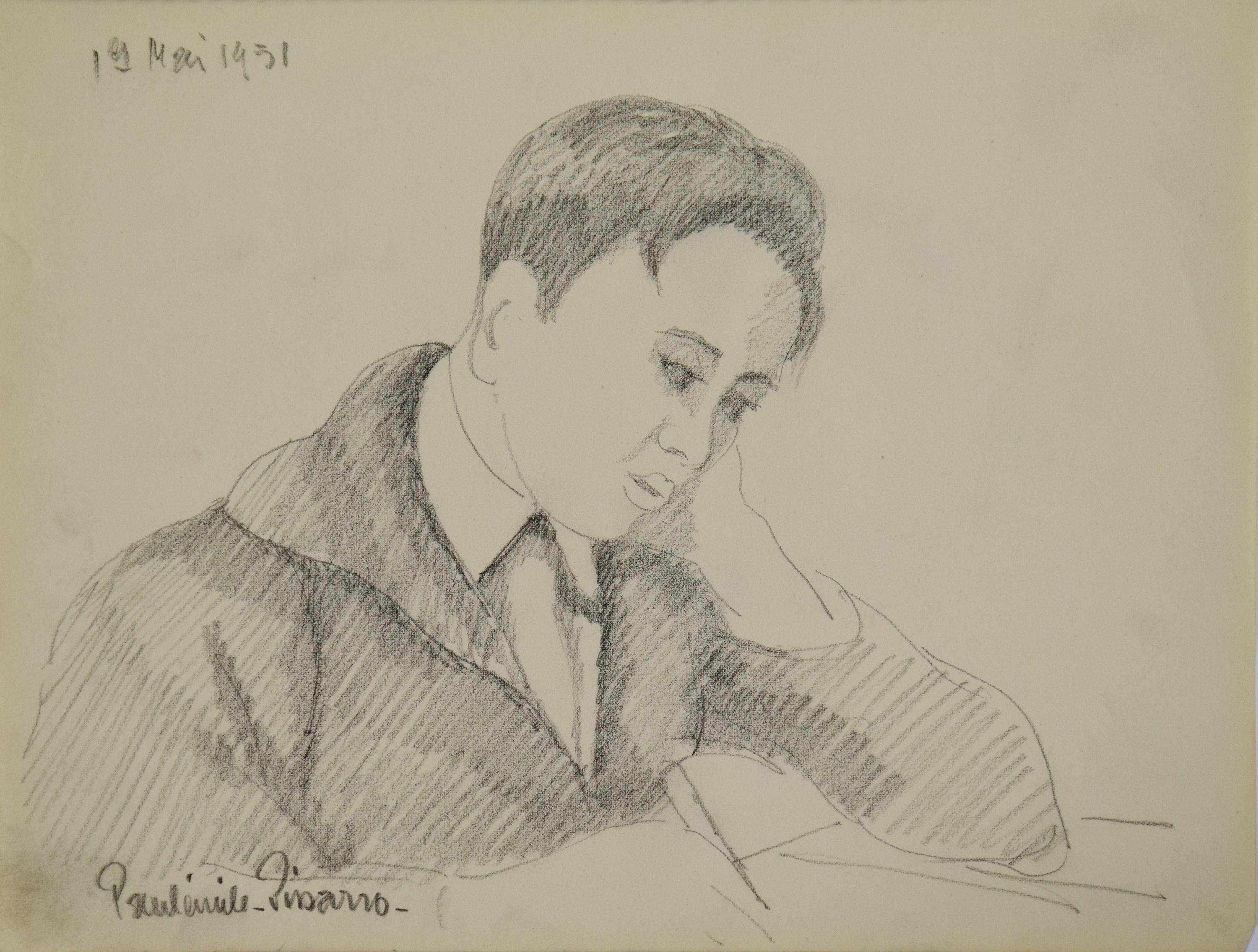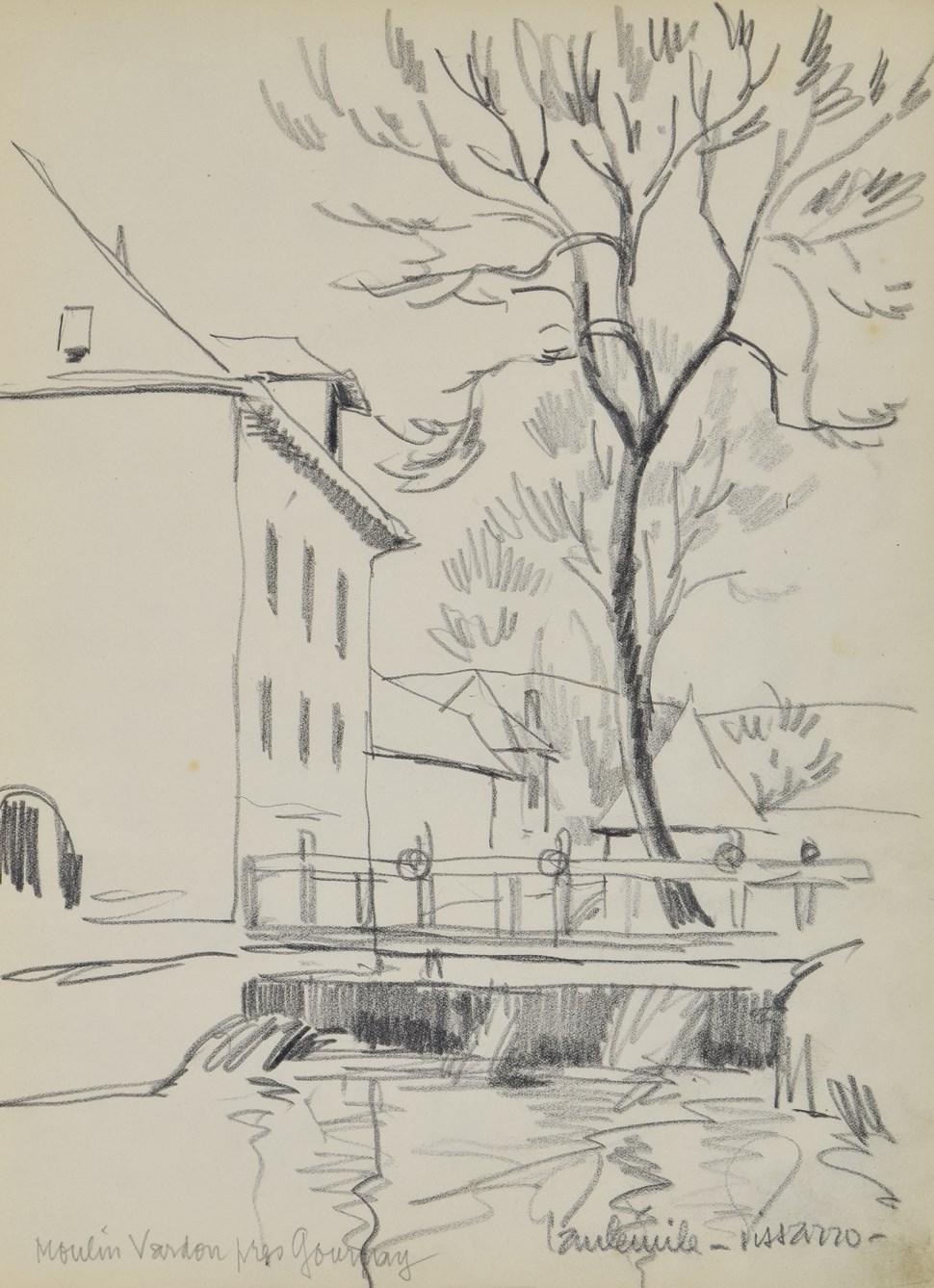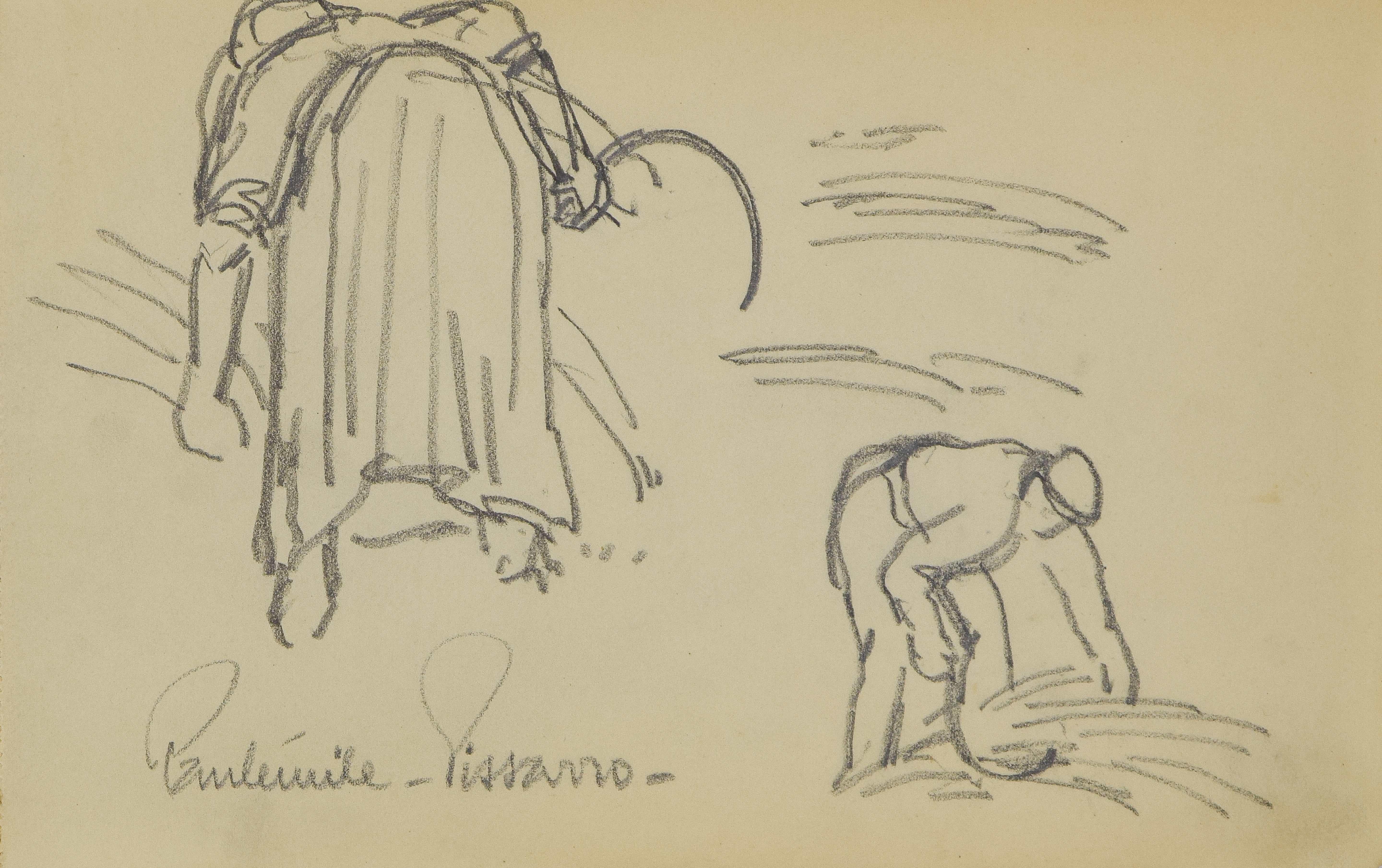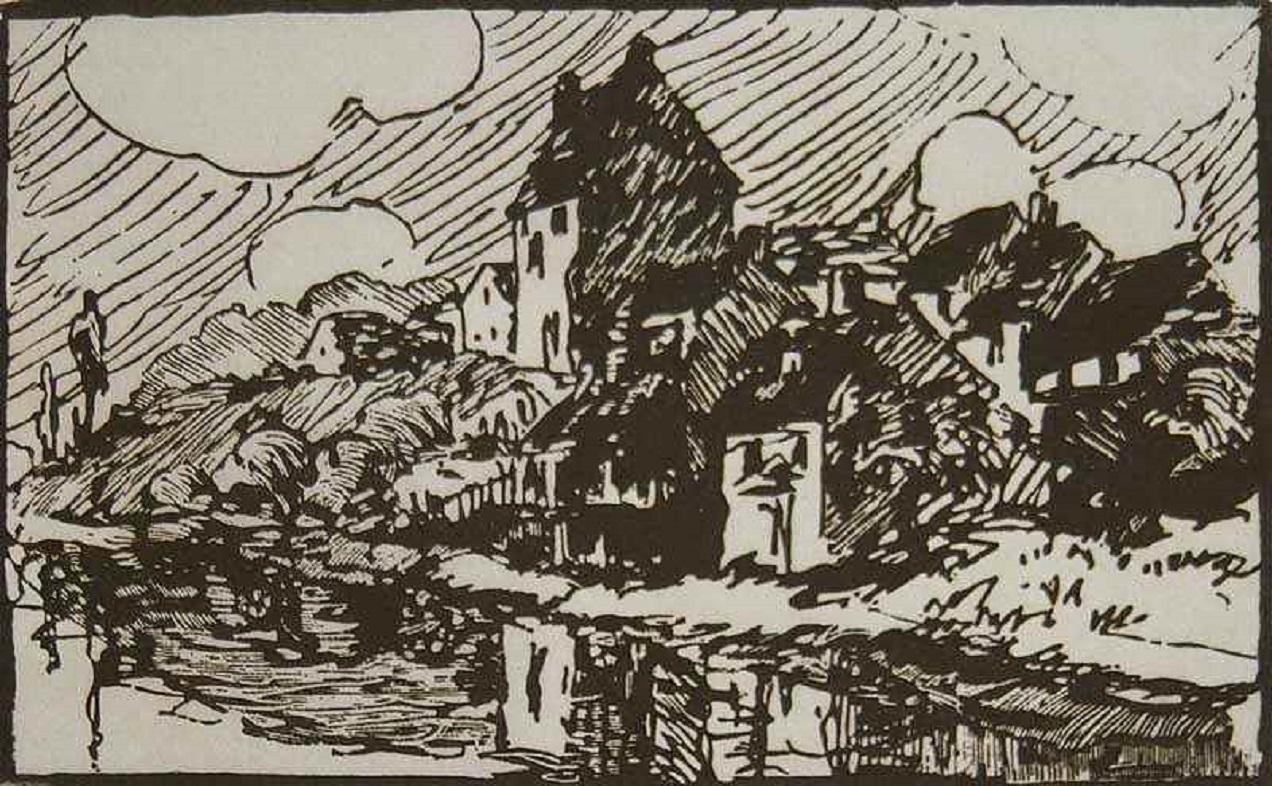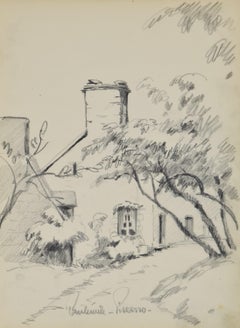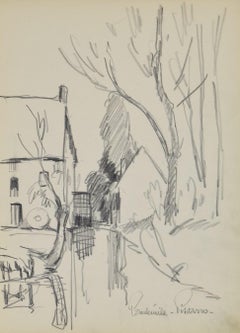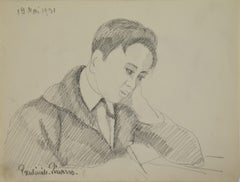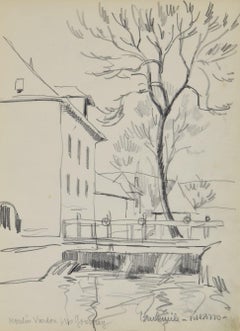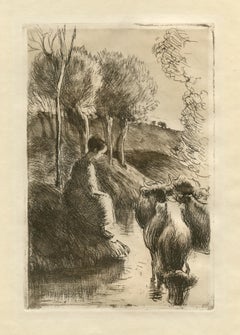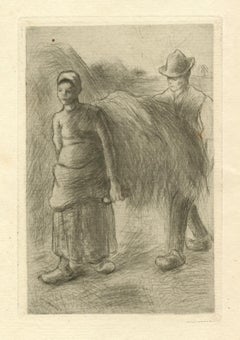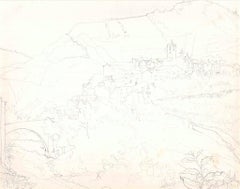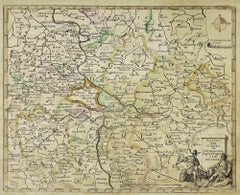Items Similar to Carte de l'Europe by Paulémile Pissarro, 1972 - Graphite on paper
Want more images or videos?
Request additional images or videos from the seller
1 of 3
Paulémile PissarroCarte de l'Europe by Paulémile Pissarro, 1972 - Graphite on paper1972
1972
$750
£569.49
€651.26
CA$1,047.86
A$1,165.45
CHF 608.56
MX$14,182.26
NOK 7,772.25
SEK 7,289
DKK 4,860.58
Shipping
Retrieving quote...The 1stDibs Promise:
Authenticity Guarantee,
Money-Back Guarantee,
24-Hour Cancellation
About the Item
THIS WORK IS SOLD UNFRAMED
Carte de l'Europe by Paulémile Pissarro (1884 - 1972)
Graphite on paper
12.9 x 20 cm (5 ¹/₈ x 7 ⁷/₈ inches)
Provenance
Estate of the Artist
Yvonne Pissarro, née Beaupel (wife of the Artist), by descent from the above, by 1972
This work is accompanied by a certificate of authenticity by Lélia Pissarro.
Artist biography
Paulémile Pissarro, Camille Pissarro’s youngest son, was born in Éragny in 1884 where he was brought up within the creatively fertile environment of his family home and, encouraged by his father, began drawing at an early age. Paulémile’s godfather was Claude Monet, who became his teacher and legal guardian after Camille’s death in 1903.
In 1905 Paulémile exhibited at the Salon des Indépendants for the first time. Although his father had supported Paulémile’s desire to be an artist, his mother was eager for him to learn a more practical trade. Therefore in 1908 he put aside his artistic pursuits to work as an automobile mechanic and test-driver, then later as a lace and textile designer, allowing him only a limited time to paint. Paulémile only fully dedicated himself to painting following a letter from his brother Lucien in London, who wrote to invite him to take part in an exhibition held in London. Subsequent to the successful sale of a number of watercolours he had sent over, the young artist became inspired to leave the textile factory and pursue a career in art.
By the 1920s Paulémile had become an established Post-Impressionist artist in his own right, spending the summer months escaping from Paris on painting trips with fellow artists Kees Van Dongen, Raoul Dufy, Maurice de Vlaminck and André Dunoyer de Segonzac. In 1922 Paulémile purchased a house in Lyons-la-Forêt, a small village within the region of his hometown of Éragny and Giverny, where he moved in with his first wife Berthe Bennaiche. During this time, he developed a form of Cubism inspired by Paul Cézanne whom he dearly admired, creating some wonderful paintings of the river Eure and its surrounding villages. There he formed a close friendship with his neighbour, the famous Art Deco designer Émile-Jacques Ruhlmann, who designed a stunning Art Deco studio for Paulémile adjacent to his house.
In 1930 he visited and fell in love with the Swiss Normandy area in the Calvados region, in particular the River Orne which runs through the valley adjacent to the villages of Clécy and St. Remy. The combination of rolling hills, bold meadows and the calm river weaving its way through the landscape offered Paulémile a new burst of inspiration. With his second wife Yvonne Beaupel, Paulémile eventually moved to Clécy in 1935, where he would remain for the rest of his life. Of their three children, both H. Claude and Yvon also became artists.
With his house backing on to the river Orne, Paulémile developed a new way of working using a boat as a floating studio, where he spent countless days painting the calm waters from between the riverbanks. Here the influence of his godfather Claude Monet became apparent, particularly in Paulémile’s depiction of water, which was revolutionised by the Impressionist icon. He also applied Monet’s lessons in horticulture to the creation of an abundant garden, offering him many more motifs for his new paintings. Alongside these river landscapes, he also painted the neighbouring hay fields, various snow scenes, some interiors and still lives. The most ambitious work in his oeuvre was a fresco painted on all four walls of his own dining room, depicting the adjacent river in which he includes family members, neighbours and friends.
In 1967 Paulémile had his first one-man show in the United States at Wally Findlay Galleries in New York. This led to widespread recognition and a degree of professional success that few Pissarro artists knew during their lifetime. Since his death in 1972, Paulémile remains one of the best known of Camille’s sons.
- Creator:Paulémile Pissarro (1884 - 1972, French)
- Creation Year:1972
- Dimensions:Height: 5.08 in (12.9 cm)Width: 7.88 in (20 cm)
- Medium:
- Movement & Style:
- Period:
- Condition:
- Gallery Location:London, GB
- Reference Number:1stDibs: LU26128867322
About the Seller
5.0
Recognized Seller
These prestigious sellers are industry leaders and represent the highest echelon for item quality and design.
Established in 1964
1stDibs seller since 2015
103 sales on 1stDibs
Typical response time: 7 hours
Associations
Society Of London Art Dealers
- ShippingRetrieving quote...Shipping from: London, United Kingdom
- Return Policy
Authenticity Guarantee
In the unlikely event there’s an issue with an item’s authenticity, contact us within 1 year for a full refund. DetailsMoney-Back Guarantee
If your item is not as described, is damaged in transit, or does not arrive, contact us within 7 days for a full refund. Details24-Hour Cancellation
You have a 24-hour grace period in which to reconsider your purchase, with no questions asked.Vetted Professional Sellers
Our world-class sellers must adhere to strict standards for service and quality, maintaining the integrity of our listings.Price-Match Guarantee
If you find that a seller listed the same item for a lower price elsewhere, we’ll match it.Trusted Global Delivery
Our best-in-class carrier network provides specialized shipping options worldwide, including custom delivery.More From This Seller
View AllPaysage by Paulémile Pissarro, circa 1934 - graphite on paper
Located in London, GB
ARTWORK SOLD UNFRAMED
Paysage by Paulémile Pissarro (1884 - 1972)
Graphite on paper
32 x 23.5 cm (12 ⁵/₈ x 9 ¹/₄ inches)
Signed lower middle, Paulémile-Pissarro-
Executed circa 1934...
Category
1930s Post-Impressionist Drawings and Watercolor Paintings
Materials
Paper, Graphite
Village au bord de l'Eau, Graphite on Paper by Paulémile Pissarro, 1934
Located in London, GB
SOLD UNFRAMED
Village au bord d l'Eau by Paulémile Pissarro (1884-1972)
Graphite on paper
32 x 23.5 cm (12 ⁵/₈ x 9 ¹/₄ inches)
Signed lower right, Paulémile-Pissarro-
Executed circ...
Category
1930s Post-Impressionist Drawings and Watercolor Paintings
Materials
Paper, Graphite
Les Devoirs by Paulémile Pissarro, 1950s, Drawing, Graphite
Located in London, GB
SOLD UNFRAMED
Les Devoirs by Paulémile Pissarro (1884 - 1972)
Graphite on paper
20.2 x 27 cm (8 x 10 ⁵/₈ inches)
Signed lower left, Paulémile-Pissarro- and dated upper left
Execute...
Category
1950s Post-Impressionist Drawings and Watercolor Paintings
Materials
Paper, Graphite
Moulin Vardon près Gournay, Graphite on Paper by Paulémile Pissarro, circa 1934
Located in London, GB
SOLD UNFRAMED
Moulin Vardon près Gournay, Graphite on Paper by Paulémile Pissarro, 1934
Graphite on paper
32 x 23.5 cm (12 ⁵/₈ x 9 ¹/₄ inches)
Signed lower right, Paulémile-Pissarr...
Category
1930s Post-Impressionist Landscape Drawings and Watercolors
Materials
Paper, Graphite
Le Ramassage des Foins by Paulémile Pissarro - Graphite drawing
By Paul Emile Pissarro
Located in London, GB
Le Ramassage des Foins by Paulémile Pissarro (1884-1972)
Graphite on paper
12.9 x 20 cm (5 ¹/₈ x 7 ⁷/₈ inches)
Signed lower left, Paulémile-Pissarro-
Provenance
Estate of the Artist...
Category
Mid-20th Century Impressionist Figurative Drawings and Watercolors
Materials
Paper, Graphite
Paysage à Asquins by Paulémile Pissarro - Wood Engraving Print
Located in London, GB
SOLD UNFRAMED
Paysage à Asquins by Paulémile Pissarro (1884 - 1972)
Wood engraving
9.7 x 15.5 cm (3 ⁷/₈ x 6 ¹/₈ inches)
Signed lower right, Paulémile-Pissarro, titled and numbered ...
Category
20th Century Landscape Prints
Materials
Wood, Engraving
You May Also Like
"Vachere au Bord de l'Eau" original etching on japon paper
By Camille Pissarro
Located in Henderson, NV
Medium: original etching and drypoint. This rare and beautiful impression on japon paper is one of 50 printed for the deluxe edition of the Gazette des Beaux Arts. Published in Paris...
Category
1890s Impressionist Prints and Multiples
Materials
Etching
"Paysans portant du foin" original etching
By Camille Pissarro
Located in Henderson, NV
Medium: original etching and drypoint. Catalogue reference Delteil 126. Printed on laid paper in 1900 and published in Paris by Henri Floury as the frontispiece for Gustave Geffroy's...
Category
Early 1900s Impressionist Prints and Multiples
Materials
Etching
Paysage de France - Original Pencil Drawing by A. R. Brudieux - 1960s
By André Roland Brudieux
Located in Roma, IT
Paysage de France is a original pencil drawing on paper, realized around 1960s by the French artist André Roland Brudieux (1921-1999).
Representing a urban landscape nestled in the ...
Category
1960s Figurative Drawings and Watercolors
Materials
Pencil
Map of the War between Hungary and Prussia - Etching - 19th Century
Located in Roma, IT
Map of the War between Hungary and Prussia is an etching realized during the 19th century.
Good condition.
Category
Early 19th Century Modern Figurative Prints
Materials
Etching
Map of the War between Hungary and Prussia - Etching - 19th Century
Located in Roma, IT
Map of the War between Hungary and Prussia is an etching realized during the 19th century.
Good condition.
Category
Early 19th Century Modern Figurative Prints
Materials
Etching
German Campaign - Etching by Pierre François Tardieu - 1837
Located in Roma, IT
German campaign is an Etching realized by Pierre François Tardieu in 1837.
Good conditions.
The artwork is realized in a well-balanced composition. the artwork and belongs to the s...
Category
1830s Modern Figurative Prints
Materials
Lithograph
More Ways To Browse
Paper Lace
Pissarro Camille
Watercolor Snow Scene
La Foret
Wally Findlay Galleries
Raoul Dufy Watercolour
Impressionist Hay
H Claude Pissarro
Andre Monet
Pissarro Paul Emile
Yvonne Love
Raoul Dufy Boats
New Mexico Artists
Portrait Of Family
Bright Colour Paintings
Life Size Portrait
Painting With Words
Society Portraits
